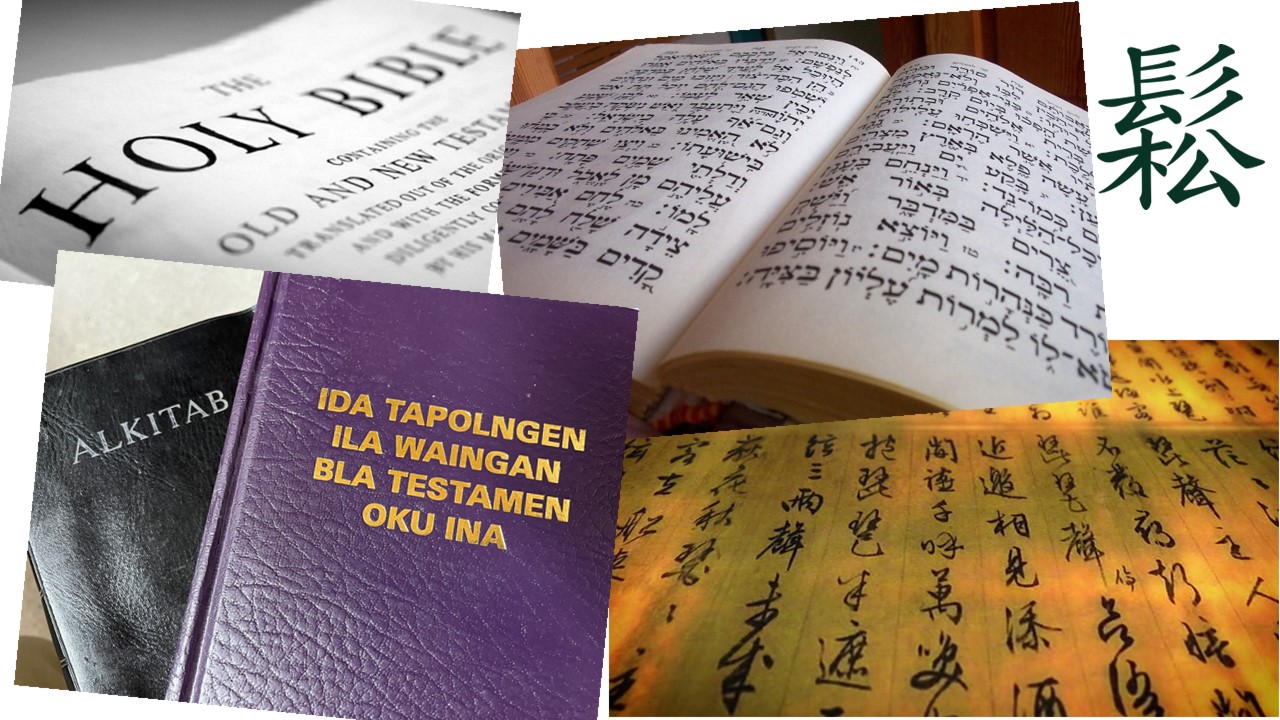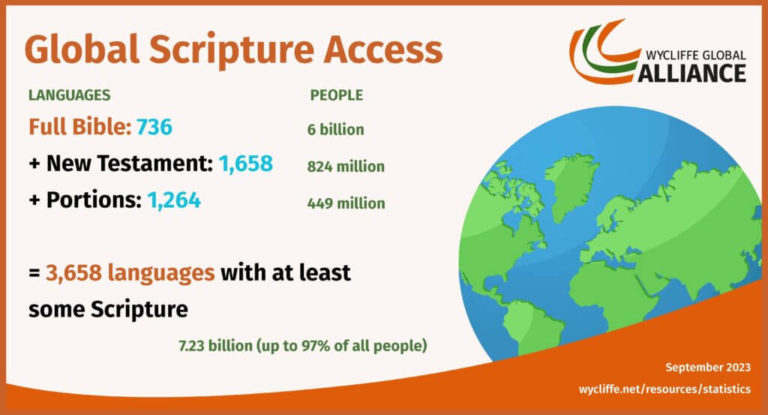
Can we accomplish The Great Commision without the Bible?
Jesus told us to go into all of the world, preach the Gospel to every creature, and teach people to obey all that He commanded us.
Can we do that without a Bible?
One third of the people in the world will be born, live, and die without ever meeting a Christian, attending a church, or seeing a Bible in a language they understand… unless we do what Jesus told us to do. There is no lack of Christians to complete the task in a timely manner. *
If you can read the Bible, then you have someone to thank for it.
Someone cared enough about God and you to, at great personal cost**, make it available to you in a language you understand.
Someone cared enough about your ability to read it that they provided a way for you to learn to read.
Faith comes by hearing what God has said. Hearing what God has said comes from His written word.
God created us to know Him. Lest His message be distorted, He had people write it down. Through the four different events of the Holy Spirit speaking to people through the apostles in their native languages, He proved to the early Church that His message was for people of every language; Jews, Samaritans, Gentiles, and dispersed peoples. (Acts 2, 8:5-25, 9:32-20:48, 19:1-7)
The good tidings of great joy can only be to all people if they understand it when they hear it. (Luke 2:10) That requires translating the Bible from a language they don’t understand into a language they do understand.
Bible translation has been a key part of the propagation of the Good News about Jesus since His resurrection.
- Why Translate the Bible? – (Excellent presentation.) – https://vimeo.com/461080440
Reasons why the people of a local church need the written word of God in their own language.
- 2 Peter 1:3-11 — People need knowledge to grow and avoid being barren and unfruitful
- 2 Timothy 3:15 — God’s word makes people wise unto salvation.
- Romans 15:4 For whatsoever things were written aforetime were written for our learning, that we through patience and comfort of the scriptures might have hope.
- 2 Timothy 2:15 – Study to shew thyself approved unto God, a workman that needeth not to be ashamed, rightly dividing the word of truth.
- Psalm 119:11 Thy word have I hid in mine heart, that I might not sin against thee.
- 2 Timothy 3:16-17 All scripture is given … That the man of God may be perfect, throughly furnished unto all good works…
- Colossians 3:16 Let the word of Christ dwell in you richly
- Joshua 1:8 …meditate therein day and night…
- Deuteronomy 6:7 ..teach them diligently…
- Ephesians 5:19 Speaking to yourselves in psalms, hymns, and spiritual songs…
- 2 Timothy 4:2 Preach the word…
- Psalm 19:7-11 The law of the LORD is perfect, converting the soul: the testimony of the LORD is sure, making wise the simple.
- Proverbs 2:1-5 My son, if thou wilt receive my words…
- Isaiah 55:11 So shall my word be that goeth forth out of my mouth: it shall not return unto me void, but it shall accomplish that which I please, and it shall prosper in the thing whereto I sent it.
- Acts 17:11 These were more noble than those in Thessalonica, in that they received the word with all readiness of mind, and searched the scriptures daily, whether those things were so.
What is the Status of Bible Translation?
Status of Bible Translation
Wycliffe Bible Translator statistics – Global Scripture Access – https://www.wycliffe.net/resources/statistics/

What is the process of Bible translation?
- Ethnos360’s Bible Translation FAQ’s
- The Bible Translation Process – vimeo.com/718451251
- How Important? – Stuart
- Introduction to Bible Translation – Crockett
- Bible Translation Teamwork
- Consultants (Experienced translators) – https://vimeo.com/440442753
- Why Translate in the Heart Language? –https://vimeo.com/691644147
- Does it make sense? – https://ethnos360.org/magazine/stories/does-it-make-sense
- Mother-tongue coworkers – https://vimeo.com/440444413
- Workshops – https://vimeo.com/440443747
Bible Translation Stories
- Dabato Bible Translation
- Bagwido Bible Translation
- Translation Brings Understanding
- Does God Speak My Language?
- Why Translate the Bible? – (Excellent presentation.) – https://vimeo.com/461080440
- One Bible Many Versions – Brunn
- Language and Linguistics – 22 Lessons – AccessTruth
- Bru: A Sacred Responsibility
- Intro to Bible Translation AccessTruth.com
- CLA: Essential for Translation
- More on translation – https://ethnos360.org/translate
Where do you get Training for Bible Translation?
The primary focus of Ethnos360 is church planting. Bible translation is huge part of that work where people have no access a Bible.
Bible translation training is a big part of equipping missionaries for the task.
Ethnos360 provides training for career missionaries involved in Bible translation.
Bible Translation Tools
Translation Tools
I often hear reports about new software or tools that can quickly translate from one language to another. “We don’t need missionaries. Just give the tools to native speakers of the language and they can do the translation themselves.” I won’t take the space to write all of the related statements and ideas I have heard.
Let me just say, “It doesn’t work that way.” There are many reasons. One is that culture cannot be taken into account by software unless that culture is known. Culture is the unspoken context that gives meaning to ideas in the words, sentences, and paragraphs of spoken and written language. The culture will remain unknown until a detective such as a Bible translator takes the time to discover and document the culture.
Another factor is that languages can be very complex. I know of a language that has 27 syllables in one word. In nearby languages, meaning cannot be understood unless geography, elevation, genders, nouns, and pronouns are properly introduced in the correct order. Since computers can only replicate know factors that are pre-programmed, software cannot translate with meaning in languages that are unknown. Just look at some of the instruction manuals that come with your devices. Even translating from the well-known languages of Mandarin, Cantonese, or Korean into English have produced some amazing unreadable and unclear results. When translating God’s written word it is very important that the original meaning is clearly communicated to the understanding of the audience.
For unwritten languages, there is no substitute to take the place of a missionary’s diligent perseverance in language and culture acquisition.
Bible Translation Stories
Translation Stories
Learn More:
- Ethnos360: Who or What is Ethnos360?
- Full Time: Serving as a career missionary
- EBI: Ethnos360 Bible Institute (also Online!)
- Wayumi: Intro to Cross-Cultural Church Planting Missions
- Short-Term: Interface, Encounter, Volunteer
- Internships: Field Support/Stateside
- Support: Teamwork for Thriving Churches
- Aviation: Millions Unreached None Unreachable
- Leaders: Church & Discipleship Resources
- Enduring Relationships: Thinking Eternal
- FAQ – Frequently Asked Questions
- Representatives: Meet, Coffee, Lunch, Zoom, FaceTime